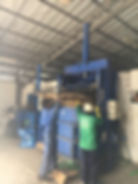Advancing Sustainable Waste Management Projects in Ecuador and Chile
- Julio Rivera Alejo
- May 1, 2019
- 3 min read
CCAP, in partnership with the Climate and Clean Air Coalition’s (CCAC) Municipal Solid Waste Initiative (MSWI), is working with the municipalities of Quito, Ecuador and Puerto Varas, Chile to support the implementation of sustainable waste management projects that reduce short-lived climate pollutants (SLCP) emissions in these cities.
The ultimate goal is to provide each city with technical, on-the-ground support to move from policy to action in the waste sector. By developing implementation plans, CCAP is helping Quito and Puerto Varas reach a ready-for-implementation stage of selected organic waste treatment projects.

This work started in the summer of 2017, when CCAP traveled to Puerto Varas and Quito to meet with relevant stakeholders and conduct a high-level assessment of each city which included reviewing all available data and information on the technical and policy aspects of local waste management as well as the national policy framework for waste and climate change.
CCAP identified that Quito sends more than 730,000 tons of waste per year to the city’s landfill, while Puerto Varas’ landfill receives about 122,000 tons per year. Around 60% of the waste in both cities is organic, and approximately 110 tons per day of organic waste could be easily recovered and treated in an initial phase of implementation rather than be transported to the landfill. Based on this information, CCAP identified promising alternative waste treatment options for organic waste and conducted an assessment of the related emissions reduction potential and the estimated implementation costs associated with each alternative.

The alternative organic waste treatment technology options considered were: composting and anaerobic digestion. Both technologies offer unique benefits to the cities. A compost plant could treat the organic waste to make compost and soil conditioning products that would re-enter the productive economy and improve agricultural yields, while reducing the use of synthetic industrial fertilizers. On the other hand, an anaerobic digestion plant could produce biogas and a nutrient-rich biofertilizer known as digestate. The biogas can be used as source of alternate energy, generating both electricity and heat. A compost plant treating 110 tons per day of the organic waste produced in the city could achieve a potential emissions reduction of 269,999 tons of CO2 equivalent over a 20 year period, while an anaerobic digestion plant could lead to a reduction of 375,072 tons of CO2 equivalent for the same period.
In March 2017, CCAP presented the results of the assessment to the relevant local and national authorities in Quito. Based on this information, as well as on the cost and return on investment estimations provided, the municipality showed interest in pursuing the implementation of a composting project. As a next step, CCAP will develop a high-level pre-feasibility study for the project, performing a more detailed analysis of relevant technical, economic, environmental, and social aspects of the composting project. This analysis will include a calculation of key financial indicators as well as the sustainable development benefits associated with the implementation of the project. Based on this pre-feasibility study, CCAP will ultimately provide the municipality of Quito with a clear plan for implementation in order to increase the chances of the project receiving approval from the municipality, obtaining financing and being fully implemented. A similar pre-feasibility study and an implementation plan will be developed for Puerto Varas once the municipality chooses their preferred alternative organic waste management option.
Once CCAP’s technical assistance is finished, both Quito and Puerto Varas will be at the ready-for-implementation stage with their respective sustainable organic waste management projects. In addition, national level authorities will receive a set of recommendations that could facilitate the replication of similar projects around the country and advance the waste sector in these countries towards their emission reduction goals.

